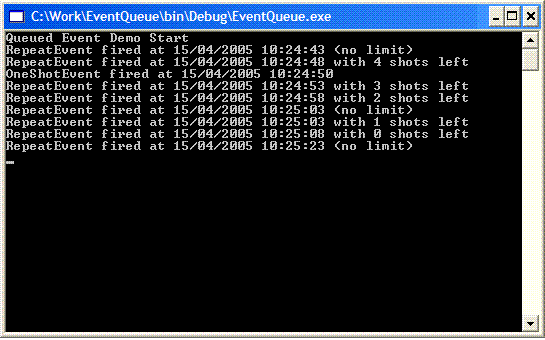
Introduction
Occasionally, I find I have a need for asynchronous events to be queued and fired at a regular interval. The actual application in this case was asking a vehicle tracking system for a location fix every 15 seconds, for various vehicles, plus occasional polling of battery state. Previously, I had used the STL PriorityQueue to do a similar thing in C++ for a nuclear reprocessing plant monitoring system, where various sensors had to be polled at different intervals.
Background
I have used BenDi's PriorityQueue code which is, I have to say, superb! My Q class derives from his base BinaryPriorityQueue.
Using the code
There's a console app that shows how to use the code - obviously it's a bit naive and you would probably want to poll the queue using a worker thread, or even embed the thread in the Q object and have it raise a .NET type event when necessary.
To use the event queue, do this:
- Build an event queue object:
EventQueue q = new EventQueue();
- Build some events to go in it...
RepeatEvent reFive =
new RepeatEvent(DateTime.Now.AddSeconds(10), 5, 5, null);
RepeatEvent reUnlimted =
new RepeatEvent(DateTime.Now.AddSeconds(5), -1, 20, null);
OneShotEvent oneShot = new OneShotEvent(DateTime.Now.AddSeconds(12), null);
- Push them onto the queue.
q.Push(reFive);
q.Push(reUnlimted);
q.Push(oneShot);
- And run this code in a loop or a thread to access the events:
while (q.Count != 0)
{
QueuedEvent qe = q.GetNextReadyEvent();
if (qe != null)
{
if (qe.Payload != null)
{
}
if (qe.ReQueue())
{
q.Push(qe);
}
}
Thread.Sleep(10);
}
Under the Hood
EventQueue derives from BinaryPriorityQueue:
public class EventQueue : BinaryPriorityQueue
Constructor calls the base constructor passing in the comparer:
public EventQueue() : base(new EventQueueComparer())
Pop and Peek are overloaded to cast result to QueuedEvent type:
public new QueuedEvent Pop()
public new QueuedEvent Peek()
GetNextReadyEvent has a look using Peek, and if the event has fired, hauls it off:
public QueuedEvent GetNextReadyEvent()
{
QueuedEvent e = Peek();
if (e != null && e.IsFired())
return base.Pop() as QueuedEvent;
else
return null;
}
Abstract QueuedEvent class is the base class that all elements of the queue derive from:
public abstract class QueuedEvent
All queued objects therefore have an 'IsFired' function:
public bool IsFired()
{
return (dtNextFiringTime < DateTime.Now);
}
RepeatEvent object derives from the abstract base and takes a quantity and an interval as parameters:
public RepeatEvent(DateTime dt, int qty,
int interval, object payload) : base(dt, payload)
And in its re-queue function, it works out the next firing time and decrements the number of shots:
public override bool ReQueue()
{
if (iNumberOfShots != -1)
iNumberOfShots--;
dtNextFiringTime = dtNextFiringTime.AddSeconds(iInterval);
return (iNumberOfShots != 0);
}
The comparer class speaks for itself, simply checks the NextFiringTime of two events:
public class EventQueueComparer : IComparer
{
public int Compare(object x, object y)
{
QueuedEvent xx = x as QueuedEvent;
QueuedEvent yy = y as QueuedEvent;
return xx.NextFiringTime.CompareTo(yy.NextFiringTime);
}
}
I think that about covers it. Nice and simple - enjoy! :o)
History
1.0 - Original posting.
This member has not yet provided a Biography. Assume it's interesting and varied, and probably something to do with programming.
 General
General  News
News  Suggestion
Suggestion  Question
Question  Bug
Bug  Answer
Answer  Joke
Joke  Praise
Praise  Rant
Rant  Admin
Admin 





